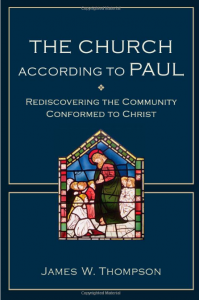Is it a church if that group of people does not celebrate baptism and the Lord’s Supper? What do you think?

James Thompson, in his excellent and dense sketch of the church in Paul’s letters (The Church according to Paul), offers this summary of “the church made visible” in baptism and the Lord’s Supper (or eucharist). I break it into points to facilitate discussion:
- The paucity of references to baptism and the Lord’s Supper does not suggest however, that these practices played an insignificant role in Paul’s theology.
- Unlike some of his converts, Paul never attributes automatic saving power to baptism and the Lord’s Supper; thus he warns against an overemphasis on both practices.
- Both baptism and the Lord’s Supper offer important visible manifestations of Paul’s major theological themes.
- While he can speak of participation in the death of Christ without reference to either ritual (cf. 2 Cor. 5:14), he appeals to both to describe the actualization of the death of Jesus in concrete ways.
- The Lord’s Supper is a visible manifestation that the community becomes unified as it participates together in the death of Jesus.
- In baptism the community is united as the members actualize the death and resurrection of Christ.
- Both are practices that must be accompanied by appropriate conduct and actualized in community life.
- Both baptism and the Lord’s Supper constitute the community as one body (1 Cor. 10:16-17; 12:12-13), communicating the believers’ incorporation in Christ (cf. Gal. 3:27).
- Baptism is consistently “into Christ” (eis christon, Gal. 3:27; Rom. 6:3) or “into one body” (1 Cor. 12:13),
- while the Lord’s Supper is the continuing practice of those who are in Christ.




